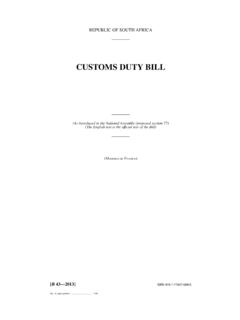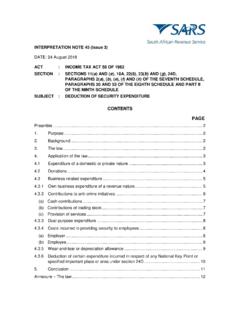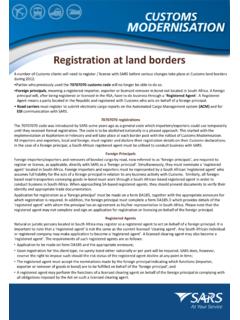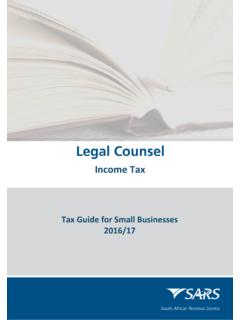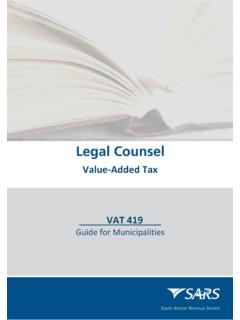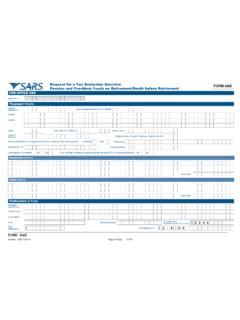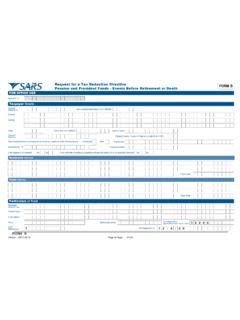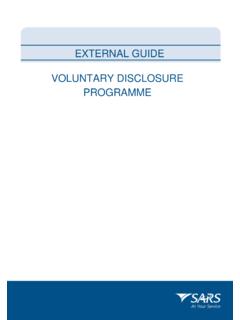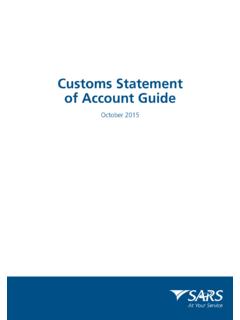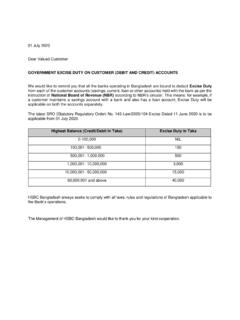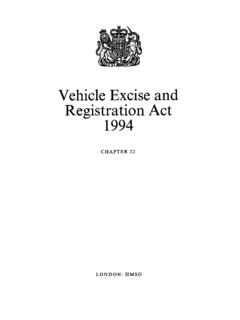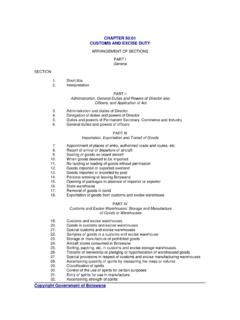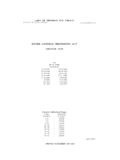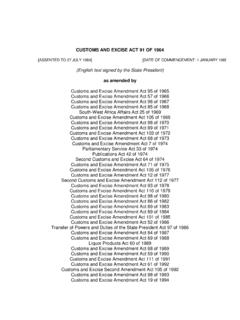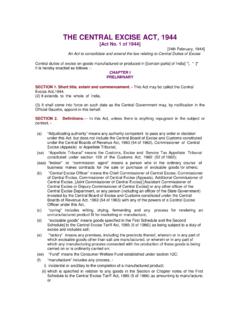Transcription of SE-ADV-02 - Ad Valorem Excise Duty - External Policy
1 Effective 16 November 2018 Excise External Policy AD Valorem Excise duty Effective 16 November 2018 TABLE OF CONTENTS 1 SUMMARY OF MAIN POINTS 3 2 Policy 3 Liability for duty 3 Keeping of records 3 Penalties 4 Appeal against decisions 4 Assessment of Ad Valorem Excise duty 5 Value for duty purposes Section 69 5 Related entities in terms of Section 66(2)(a) 5 Value to be used when entities are related 5 Price paid or payable 5 Value Added Tax 5 Invoice price 5 Deductions from the invoice price 6 Discounts 6 Rate of duty 6 duty on stolen goods 6 Calculation of duty 6 Sale of dutiable goods to Foreign Diplomats 9 Ordinary Levy 9 3 RELATED INFORMATION 9 Legislation 9 Cross References 9 Quality Records 10 4 DEFINITIONS AND ACRONYMS 10 5 DOCUMENT MANAGEMENT 12 Ad Valorem Excise duty - External Policy SE-ADV-02 Revision:6 Page 2 of 12 Effective 16 November 2018 1 SUMMARY OF MAIN POINTS a) The Policy applies to manufacturers and owners of goods liable to Ad Valorem Excise duty manufactured for him / her partly or wholly from materials owned by such owner.
2 B) This Policy does not cover: i) Customs and Excise payments as this is dealt with in document BP-02; ii) Declaration and Return submission via e-Filing as this is dealt with in document SE-ACC-02-M02; iii) Submission of Accounts / Returns as this is dealt with in document SE-ACC-05; iv) The Completion of the DA 75 Ad Valorem Excise duty Account as this is dealt with in document SE-ADV-03-M01; v) Bonds as this is dealt with in document SE-BON-02; vi) Accounting for duty / levy as this is dealt with in document SE-GEN-02; vii) Introduction to Excise Duties, Levies and Air Passenger Tax as this is dealt with in document SE-GEN-04-G01; viii) Licensing as these are dealt with in document SE-LR-02; ix) Prescribed payment terms / periods as this is dealt with in document SE-PAY-02; x) Refunds as these are dealt with in document SE-REF-02; and xi) Tariff Determination as this is dealt with in document SE-TDN-02. 2 Policy Liability for duty a) Ad Valorem Excise duty is a fiscal measure imposed on certain locally manufactured goods and a corresponding Ad Valorem Excise duty (at the same rate) is imposed on imported goods of the same class or kind.
3 B) The goods on which Ad Valorem Excise duty is imposed are listed in Section B of Part 2 of Schedule 1 (Sch1P2B). Thus, a local manufacturer of perfumes for example, would pay the Sch1P2B rate of Ad Valorem Excise duty whilst an importer of perfumes would pay the Schedule 1 Part 1 rate (if applicable) as well as the Sch1P2B rate of Ad Valorem Excise duty . Examples of such goods include: i) Air conditioning machines; ii) TV sets and other electronic equipment; iii) Motorcycles and motor vehicles; iv) Firearms; v) Cellular telephones; and vi) Perfumes and skin care products. c) Every manufacturer of Excisable goods specified in Sch1P2B and every owner of Excisable goods specified in Sch1P2B manufactured for him / her partly or wholly from materials owned by such owner must licence his / her premises as a special Customs and Excise warehouse (VS). d) Notwithstanding anything contrary in the Act, the Commissioner for the South African Revenue Service (SARS) may, subject to such conditions as he / she may impose in each case, in circumstances as he / she may deem expedient, license the premises of any dealer.
4 E) Section 36A read with additional Rules for Section 36A contains the special provisions in respect of the manufacture of goods specified in Sch1P2B. This includes the licensing provisions as well as the obligations in terms of the account submission and duty payments. Keeping of records a) Exempted clients must keep suitable production and disposal records which must be made available for inspection on demand by an Auditor Excise (AE). b) Section 101 read with Rule requires that licensees keep within South Africa (SA), the books, accounts / returns and documents relating to their transactions as the SARS may require. Ad Valorem Excise duty - External Policy SE-ADV-02 Revision:6 Page 3 of 12 Effective 16 November 2018 c) Generally this includes all commercial records and documents relating to the manufacture, ownership of and / or dealing in goods subject to Ad Valorem Excise duty . Typically, these commercial documents would relate to the following: vii) Removal of goods from the licensed premises; viii) Sales; ix) Imports; x) Exports; xi) Stock; xii) Handling; xiii) Production; and xiv) Purchases.
5 D) In addition to these records, AE s may examine the following documents / reports to verify the disclosures relating to the Ad Valorem Excise duty payments (or not) of any person as it relates, i. e.: i) Management accounts / returns and reports; ii) Internal and External auditors reports; iii) Financial statements; and iv) Any record maintained for a business purpose. e) The clients records must be: i) Accurate and kept up to date; ii) Completed in ink; iii) Readily available to the SARS; iv) Kept for at least (five) 5 years from the date of manufacturing, sale and / or removal; and v) Be available for inspection at all reasonable times. f) The Ad Valorem Excise duty account (a summary of how the duty due was ascertained) must be made available to the AE s / Operations Specialists (OS s) / Functional Specialists (FS s) together with the applicable schedules. Penalties a) Failure to adhere to the provisions of the Act, as set out in this document, is considered an offence.
6 B) Offences may render the client liable to, as provided for in the Act: i) Monetary penalties; ii) Criminal prosecution; and / or iii) Suspension or cancellation of registration and / or license. Appeal against decisions a) In cases where clients are not satisfied with any decision taken in terms of the Act, they have a right of appeal to the relevant appeal committee. The Policy in this regard, as well as the process to be followed, is contained in document SE-APL-02. b) Should clients be unhappy with a decision of any appeal committee, their recourse will be to lodge an application for Alternative Dispute Resolution (ADR) with the relevant appeal committee. The committee will add its comments thereto and forward the application to the ADR Unit for attention. The Policy in this regard, as well as the process to be followed is contained in document SC-CC-26. c) Should clients wish to appeal any decisions in terms of Value-Added Tax (VAT) penalties, they are directed to the provisions of Sections 215 to 220 of the Tax Administration Act No.
7 28 of 2011 for the percentage based penalty and 224 of the said Act for the understatement penalty. In this regard, please consult the SARS website or nearest SARS Branch Office. Ad Valorem Excise duty - External Policy SE-ADV-02 Revision:6 Page 4 of 12 Effective 16 November 2018 Assessment of Ad Valorem Excise duty Value for duty purposes Section 69 a) Ad Valorem Excise duty due on all goods, except for the motor industry, is calculated on the invoice price paid or payable for the goods when such goods are sold for home consumption in the ordinary course of trade, in the condition and the normal trade packing ready for sale in the retail trade, to any buyers not deemed to be related as specified in Section 66(2)(a) under fully competitive condition, plus the cost of packing and packages and all other expenses incidental to placing the goods on any vehicle for delivery to the purchaser (excluding VAT and the relevant Ad Valorem Excise duty ), taking into account that industries that qualify for deductions in terms of Rule may deduct such from the invoice price.
8 B) Ad Valorem Excise duty on motor vehicles is assessed on the Recommended Retail Price (RRP) to the end user (excluding VAT and the relevant Ad Valorem Excise duty ). c) The RRP excludes the environmental levies in terms of Rules and respectively, when declaring the Ad Valorem Excise duty . Refer to the calculation of duty in paragraph (c)(vi) Motor vehicles manufactured locally . d) The invoice price / value for duty purposes must be rounded up to the nearest rand; fifty cents (R0-50) and more must be regarded as R1-00, but the actual Ad Valorem Excise duty amount must be rounded off to the nearest cent. Related entities in terms of Section 66(2)(a) a) Two (2) persons shall be deemed to be related if: i) They are officers or directors of each other s businesses; ii) They are legally recognised partners in business; iii) The one (1) is employed by the other; iv) Either one (1) directly or indirectly owns, controls or holds 5% or more of the equity share capital of the other; v) One (1) of them directly or indirectly controls the other; vi) Both of them are directly or indirectly controlled by a third person; vii) Together they directly or indirectly control a third person; or viii) They are members of the same natural family.
9 Value to be used when entities are related a) In terms of Section 69(1)(d)(ii), the value for duty purposes to be used when the buyer and seller are related, as specified in Section 66(2)(a), shall be the price of the goods when sold by comparable traders in similar quantity levels to unrelated buyers at or about the same time as the sale was made to such related buyers. Price paid or payable a) The price paid or payable means the total payment made or to be made, either directly or indirectly, by the buyer to or for the benefit of the seller for the goods, but does not include dividends or other payments passing from the buyer to the seller which do not directly relate to the goods. Value Added Tax a) VAT will not form part of the nett invoice price for the purpose of calculating the Ad Valorem Excise duty . b) In terms of Section 7(3) of the VAT Act, VAT is payable on Ad Valorem Excise duty . Invoice price a) The Ad Valorem Excise duty charged on the goods will not form part of the nett invoice price when calculating the Ad Valorem Excise duty due.
10 Ad Valorem Excise duty - External Policy SE-ADV-02 Revision:6 Page 5 of 12 Effective 16 November 2018 Deductions from the invoice price a) The invoice price may be reduced, by qualifying entities, by a deduction prescribed by the Commissioner in Rule (a) in respect of any goods specified in any such item of Sch1P2B. Discounts a) Discounts may be deducted from the invoice price for all goods, except goods on which a deduction in terms of Rule (a)(i) was already allowed, provided that such discount, remission or credit are equally available to any potential participant in the normal course of trade in such goods. Rate of duty a) The rates of duty on all the goods that attract Ad Valorem Excise duty can be found in Sch1P2B. b) The Ad Valorem Excise duty rate is based on the value of the goods (invoice price). duty on stolen goods a) There is no provision in the Act whereby the Ad Valorem Excise duty may be waived on goods, liable to such duty , stolen.
